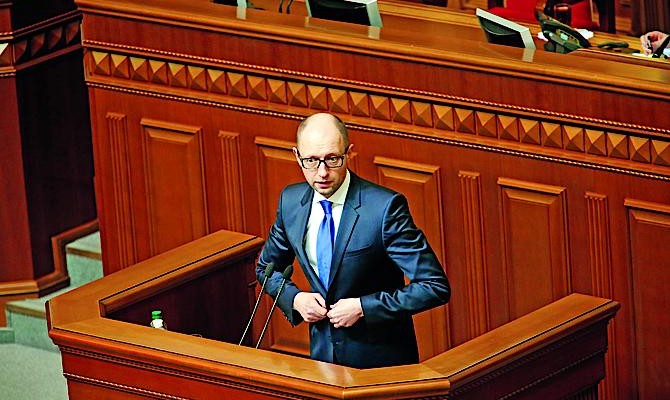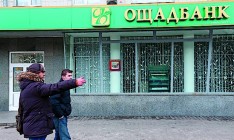Economy
Public financeThe budget for 2015 will be filled by the NBU’s printing press and the dreams of the government

Yesterday, the Cabinet introduced to the parliament a revised draft of the national budget for 2015. In addition to it MPs received for consideration 46 bills, which should be passed before the main cost sheet is approved. The MPs do not want to approve them criticizing both the documents and the government’s desire to discuss them on a tight schedule. As a result, adoption of the national budget was postponed until New Year’s Eve. Today, the “auxiliary” draft laws were submitted for review by the parliamentary committees. According to the resolution approved yesterday by the parliament, MPs will have to pass the bills in the first reading on Thursday and in the second reading on Sunday based on the results of the work of committees. MPs will vote on the national budget only a week later, on December 30.
Printing mechanism
The Ministry of Finance based the draft budget on a pessimistic macroeconomic outlook agreed by the Ministry of Economic Development and Trade and the International Monetary Fund during the two visits of the IMF mission to Kyiv in November–December. They suggest that after the 7% recession this year, next year real GDP will fall by another 4.3%. In this case, the nominal GDP will increase from UAH 1.525 bn in 2014 to UAH 1.7208 bn in 2015 and consumer prices will rise by 13.1% by the end of the year. In addition, Premier Arseniy Yatsenyuk said that when calculating the budget officials used the average exchange rate of UAH 17/USD.
The forecasts for the decline in GDP and inflation do not raise skepticism among experts in contrast to the forecast of the exchange rate. It seems doubtful in view of the volumes of hryvnia emission by the National Bank of Ukraine, which the Cabinet is counting on. In 2015, the government is counting on receiving from the NBU 65.4 bn, which is three times more than this year. Given the fact that the regulator has to transfer the money in advance to the state treasury by May 11, the issue is mainly about cash inflows that the NBU will mint, says Executive Director at CASE Ukraine Dmytro Boyarchuk.
In addition, according to Head of the Analytical Department at Concorde Capital IC Oleksandr Parashchiy, the NBU will have to “use the printing press” to buy UAH 51.6 bn worth of T-bills from the Finance Ministry (the difference between the amount of involvement and maturity of government bonds in 2015) and cover UAH 31.5 bn of budget spending on Naftogaz.
Also, hryvnia emission could be used to finance the Deposit Guarantee Fund and bank recapitalization. If the outflow of currency from the economy persists, as it did this year, with such volumes of emission of hryvnia the national currency may devaluate to below UAH 17/USD, thereby undermining the fulfillment of the national budget.
Profitable illusion
Despite the justification of the majority of macroeconomic outlooks, in terms of maintaining of the rate of UAH 17/USD, implementation of the profitable part of the proposed budget is questionable due to the high hopes for receiving individual sources of funds. The Finance Ministry expects that next year budget revenues will amount to UAH 475.2 bn, which is UAH 97.4 bn or a quarter more than provided for in 2014 and UAH 107.5 bn more than the state treasury actually received over 11 months. Member of the VR Budget Committee and former Finance Minister Viktor Pynzenyk believes that it is impossible to provide such revenues amidst the 4.3% decline in the economy, unless you count on inflation above the proposed 13.1%.
The bulk of the additional infusions should be backed by the NBU. This is an unfavorable yet realistic source of funds for the economy in contrast to the growth of tax revenues by 22% to UAH 365.6 bn compared with the current year. Due to innovations envisaged by the changes to the Tax Code, the Cabinet hopes to increase revenues from the PIT by 30%, from excise duties - by 43%, from the import duty – by 2 times, said economic expert of the International Center for Policy Studies Angela Bochi. But part of the tax innovations may not justify themselves and thereby frustrate implementation of the budget. For example, Boyarchuk says that expanding the progressive scale of the personal income tax is unlikely to help legalize costs, thanks to which the Cabinet hopes to increase revenues from the personal income tax by UAH 28.1 bn.
It is also unlikely that the Cabinet will be able to get UAH 17 bn, or US $1 bn from privatization of state-owned enterprises. In one of the 46 bills the government proposed to cut the list of state-owned enterprises not subject to privatization from more than 1,500 companies to 1,200. But in 24 years of its independence, Ukraine fulfilled the privatization plan only twice - when it sold Kryvorizhstal in 2005 and Ukrtelecom in 2011. Based on the results of the period January–October 2014, privatization brought the state treasury a total of UAH 59.9 mn in revenues, while the government expected to receive UAH 17 bn, according to the Ministry of Finance. “The Cabinet has enough objects that it could sell for UAH 17 bn, but the question is whether it will have time to do so over the next year and how much it will manage to earn from it,” said Parashchiy.
As a result, focusing on such overstated parameters for filling of the state treasury, the government is at risk of not “fitting” into the expected budget deficit next year. As the Cabinet promised the IMF, the deficit was forecast at the rate of 3.7% of GDP or UAH 63.7 bn, exclusive of “holes” in the balance of Naftogaz, which will expand the real fiscal deficit by another 4.1% of GDP or UAH 68.6 bn.
For Ukraine, this could be fraught with troubles because, according to the Minister of Finance Natalie Jaresko, 30% of UAH 527.2 bn budget expenditures is set aside for payment of old debts of the state in order to avoid default, as well as for defense and security.






 of the agreement of syndication with Financial Times Limited are strictly prohibited. Use of materials which refers to France-Presse, Reuters, Interfax-Ukraine, Ukrainian News, UNIAN agencies is strictly prohibited. Materials marked
of the agreement of syndication with Financial Times Limited are strictly prohibited. Use of materials which refers to France-Presse, Reuters, Interfax-Ukraine, Ukrainian News, UNIAN agencies is strictly prohibited. Materials marked  are published as advertisements.
are published as advertisements.